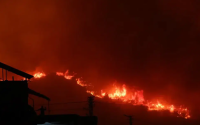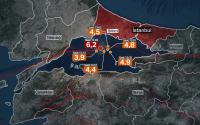15 January 2008 J. Sri Raman
Two debates have raged in Pakistan and among Pakistanis everywhere since Benazir Bhutto's tragic end on December 27, 2007. One of these is about who killed the former prime Minister and leader of the Pakistan People's Party (PPP). The other is about who, regardless of such formal designations and descriptions, she really was.
And the second debate, far more important from the point of view of the pro-democracy movement, is leading, not so strangely, to a large agreement on what Bhutto represents in her death, though differences persist on what she was in her life.
The debate on her death is largely one between the Pervez Musharraf regime and the rest of Pakistan. There is practically no taker for the official version announced on the morrow of the tragedy that "Bhutto was killed when she tried to duck back into the vehicle, and the shock waves from the blast knocked her head into a lever attached to the sunroof, fracturing her skull." Seen as a despicable attempt to deny her martyrdom (though not the attempt on her life), the "accident" theory has only made the tragedy appear to more and more people as a Musharraf crime.
Practically no one expects official inquiries to unearth the truth about the tragedy. The Scotland Yard team, in Pakistan since January 4, 2008, is not expected, either, to demonstrate its investigative skills, with much evidence destroyed by the Pakistani police hosing down the crime scene within 90 minutes of the event, and no findings from any formal autopsy on the slain leader's body.
The differences, among the debaters outside the regime, have been between those who attribute the assassination to the intelligence agencies and others who see it as the work of pro-regime politicians. Quite a few see the involvement of Islamist extremists, but none rule out links between them and the regime.
Far from the regime, which dare not discuss anything relating to Bhutto other than the manner of her death, the debate has been fiercer on who she was. Millions may have mourned her in the streets of Pakistan, but that has not stopped many from recalling her political failures as the country's prime minister for two terms, and in her subsequent role.
They, for example, have recalled, despite winning popular elections, she still chose to appease the Islamists, and even the military, in the fond hope this would fortify her position. Her role in strengthening the Taliban on Pakistani territory is recalled, and so is her encouragement of extremist incursions into India-administered Kashmir. Peace activists are not particularly nostalgic about her part in pushing Pakistan on to the path of nuclear weapons.
Her terms in office were also tarnished by corruption scandals, though the PPP stresses none of the charges has been proven. The image of her husband Asif Ali Zardari, labeled Mr. Ten Percent and later Mr. Thirty Percent, was no invaluable asset to her. None of this, however, made any difference to the nationwide outpouring of grief at her violent end. Bhutto herself may not have survived it all, but her appeal did survive her abandonment of her links with the Islamists and her outspoken opposition to them in the final phase of her life and political career. She did not lose any of her appeal, either, by refraining from anti-India rhetoric in the same period. Yes, she reportedly did refer in passing to her father Zulfikar Ali Bhutto's role in Pakistan's emergence as a nuclear-weapon state. But that was not the main thing about her father she recalled.
Far more repeatedly, she recalled Zulfikar's famed image as Pakistan's leader with the largest constituency of the poor, especially industrial workers. Without questioning the claim, however, critics have also recalled the "populist politics" of the Bhuttos and the PPP.
What this constituency is mourning, perhaps, is the passing of a leader who symbolized democracy in her own special way. She was a civilian politician with her own base in a country and a society under an army's thrall. She was a leader who raised secular pro-poor slogans, even if as part of "populist politics," though she may have tried to make peace with clerical power while in office.
It is this dimension of her personality and politics that makes her a force for democracy in death.
Mahnaz Ispahani, a Pakistani scholar in the US Council on Foreign Relations (which publishes the prestigious foreign Affairs), makes an insightful point in a recent article: "From her early 20s, Benazir Bhutto was a true civilian politician. That is to say, she was not a creature of the military, as are most prominent Pakistani politicians and bureaucrats ... She was a secular woman leader with a powerful political constituency that she sought to mobilize, first against dictators and then against Islamists." Ispahani adds, "This constituency must survive and be nurtured in Pakistan if the extremists are to be faced down."
Another voice in the debate comes from Mohsin Hamid, Pakistani-British author of "The Reluctant Fundamentalist" (a novel shortlisted for the Booker Prize in 2007). In a recent newspaper article, he talks about going home to Lahore at a time of turbulence. He recalls hearing of Bhutto's end and finding himself more strongly affected than he would have expected.
He then talks of two friends coming to see him. "In October, when Bhutto first returned to Karachi from self-imposed exile abroad, they had ridden in her convoy. Their car was immediately behind Bhutto's vehicle, and they saw the blasts of that initial unsuccessful suicide bomb attack on her. But they keep speaking of what preceded the carnage: the rapturous reception she received from her supporters. They tell me it was beautiful, with all the singing and dancing and cheering of a carnival. It was a Pakistan they had never seen before, full of diversity and hope, with people from all four provinces and even the religious minorities out in a show of joy."
Their hope, obviously, was democracy would return with Bhutto. After the tragedy, says Hamid, "change is in the air." He adds, "Opposition parties are uniting against the Musharraf-led establishment. Elections, even though they have been postponed until February 18, seem poised to deliver a powerful rebuke to the current regime, unless, of course, they are rigged."
Hamid goes on: "In the United States, there will be newspaper columns and television talk shows dedicated to 'loose nukes' and the 'war on terror.' Here in Pakistan, one can see signs of people coming together. Scare stories notwithstanding, it is possible (although by no means certain) that out of this tragedy the world's sixth-largest nation may succeed in finding its voice - and with that the chance for a better future." A different, but strangely similar note, is struck by Pervez Hoodbhoy, a scientist and peace activist who has taken a courageous stand against clergy-backed extremism. In an interview to the Italian daily, La Repubblica, Hoodbhoy does not have too many kind words to say about Bhutto's role, in or out of office. He is categorical, however, about the consequences of the tragedy of three weeks ago: "Ms. Bhutto makes an excellent martyr. In her death she will doubtlessly play a more positive role than when alive."
Hoodbhoy adds, "As for the gainers and losers: Islamist groups saw Bhutto as a tool of America that would be used against them, and a leader who could secularize Pakistan. Plus, she was a woman and popular. But Musharraf and his political party, the PML(Q), have also gained because a political rival has been eliminated. The losers are those Pakistanis who wish for a secular, modern Pakistan and not one that is run by mullahs. Although she never delivered on her promises, her followers never lost faith."
If that is how intellectuals see the posthumous role of Bhutto in Pakistan's political life, the common people would appear to endorse the view in emotional terms. A poll by the Gallup Pakistan, affiliated to Gallup International, has come out with findings that reveal the remarkable dimensions of a nationwide and "across-the-board" grief caused by the death of BB (as Benazir Bhutto was known to her friends and followers). The death, it is clear, can help Pakistan's fledgling pro-democracy movement far more than her return to Pakistan did - and her return to power in the country's uncertain conditions would have done.
A freelance journalist and a peace activist in India, J. Sri Raman is the author of "Flashpoint" (Common Courage Press, USA). He is a regular contributor to Truthout.






